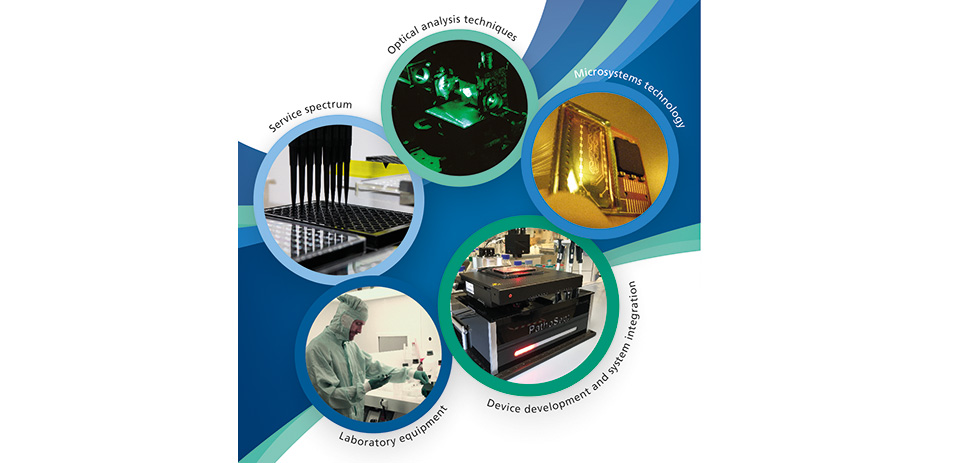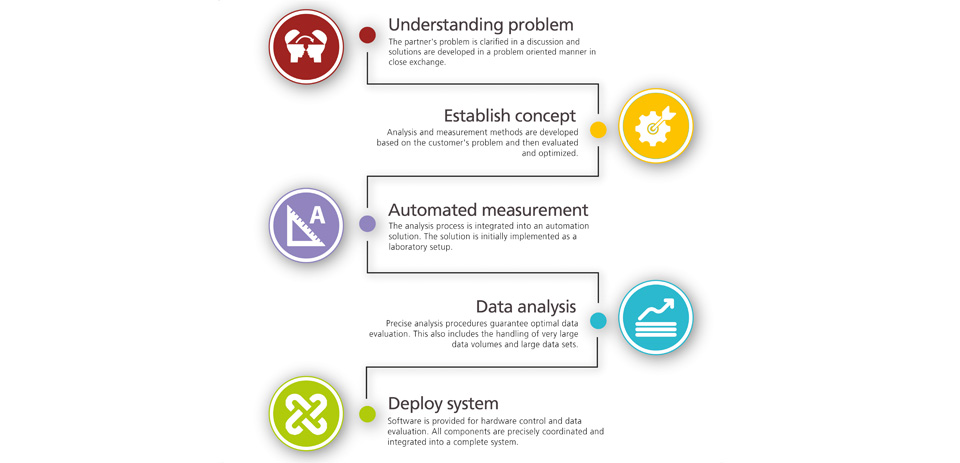
Our services

Tabbed contents
Device development and system integration
In the biological laboratory we focus on integrating biological and diagnostic assays into microfluidic systems. From particle modifications or fluorescence labeling of proteins to surface modifications for biological applications, optical detection of fluorescence signals and determination of the kinetic properties of biological reactions, we adapt all steps to the microfluidic problem at hand.
Establishing and evaluating anti-gene / anti-body sandwich assays to determine diagnostic parameters is an additional field of application.
The equipment in our labs covers a broad range of basic molecular biological techniques, e.g., UV–VIS photometric measurements, fluorimetric measurements, realtime PCR methods and protein purification (FPLC) etc.
Additional equipment for cell-based applications will be installed in the near future. It will allow us to cultivate several different cell types in microfluidic systems and to measure their signal parameters.
Optical analysis methods
In the field of scientific and applied optics, we develop customized systems, in particular for ultra-sensitive detection.
To keep development cycles short and to deliver high-quality results already in the early design phases, we use state-of-the-art software such as ZEMAX and TracePro for the design of optical systems. Conceptual designs can be implemented as lab prototypes and thoroughly evaluated in our state-of-the-art laser lab.
For optimal results, we work very closely with our clients throughout the design and development phases.
Besides developing customized systems, we support our clients in integrating optical standard components. Based on our experience from many years we select and purchase the best-suited components from selected manufacturers. When necessary we also carry out mechanical modifications.
Microsystems technology
Through developing systems for analysis, diagnostics and screening in biological applications, we built up significant competence in microfluidics, e.g. in the area of interfacing and bonding technologies for integrating sensors into biochips and providing a reliable interface between biochip and measuring system. In our class 1.000 cleanroom we use silicon or polymer molding to produce microfluidic structures for hybrid microsystems. Designs can be modeled and optimized using CFD software.
For our clients, we can thus design, manufacture and characterize microfluidic systems for a broad range of applications in bioanalytics, but we also develop solutions for more specific problems and carry out feasibility studies in this area.
Our services
We offer a wide range of services in the life sciences. In order to best determine and serve our clients’ specific needs and requirements, we follow a proven process that closely involves each client:

When we start working with a client, we invest considerable time and effort to understand their problem. As part of our consulting, we conduct a requirements analysis and sketch a draft concept in the form of a proposal. If the client so desires, this will be followed up by developing a detailed concept for solving the problem. The client’s specific problem is the focus here, so the solution strategy may differ significantly from case to case. Beyond the consulting phase, one of our core competencies is assay and system development. We offer solutions from a single source. Our focus is on the development of optical measurement methods and measuring systems. This may involve completely new developments or the optimization or replacement of existing systems. Some of our scientists are experts in the analysis of complex data sets. We offer statistical analyses and evaluations to derive information from measurement data. The final step is to integrate the individual components into a fully functioning system. Our systems are characterized by a high degree of automation as well as by outstanding longevity.
Prototype systems we built include:
- Reconstruction and enhancement of an automated measuring system for immunohistology (Melk)
- Automated polarizing microscope for the analysis of rock sections (Petroscan)
- Automated transmission microscope for the analysis of bacterial growth in microtiter plates (PathoSept)
- Compact automated confocal microscope for fluorescence fluctuation spectroscopy (FluoroDrop)
- Camera system for automated evaluation of plant growth for research (Growthmonitor)
- Electrowetting-on-dielectric system for the transport and manipulation of tiny sample droplets (Moses)
- Cultivation module for the enrichment of bacteria in a blood sample (PathoSept)
- Microscopy platform adaptable to a wide range of requirements thanks to its modular design (TosoScan)
Our laboratory facilities for assay evaluation and development include an optics lab, a bio lab, a sensor and microfluidics lab, and a cleanroom.
Our interdisciplinary team, a versatile equipment pool, and many years of experience in instrument development can help you realize your ideas. Feel free to contact us to discuss how you can benefit from our consulting service and the development and integration of systems and assays.
Lab equipment
Molecular biology lab
S1 safety class molecular biology lab; CCD image analysis system for electrophoresis gels; DNA sequencer; UV/VIS spectrophotometer / fluorimeter; HPLC and FPLC systems; pipette robots and liquid-handling systems.
Cleanroom
Class-1000 cleanroom; photomask design; 3D fluidics simulation; isotropic and anisotropic etching; microfluidic interface and bonding technologies.
Laser lab
Single-molecule tracker; microfluidic system with highly sensitive fluorescence detection; several DPSS and semiconductor lasers; modulated Ar-Ion laser; pulsed Excimer laser; ultrafast and gated image intensifiers; upright and inverse fluorescence and stereoscopic microscopes; cooled CCD cameras with sensitive objectives.
Electronics lab
High-speed parallel computers based on FPGA-technology; standard measuring station for digital circuit boards; CAE design software for complex circuit boards; FPGA design software.